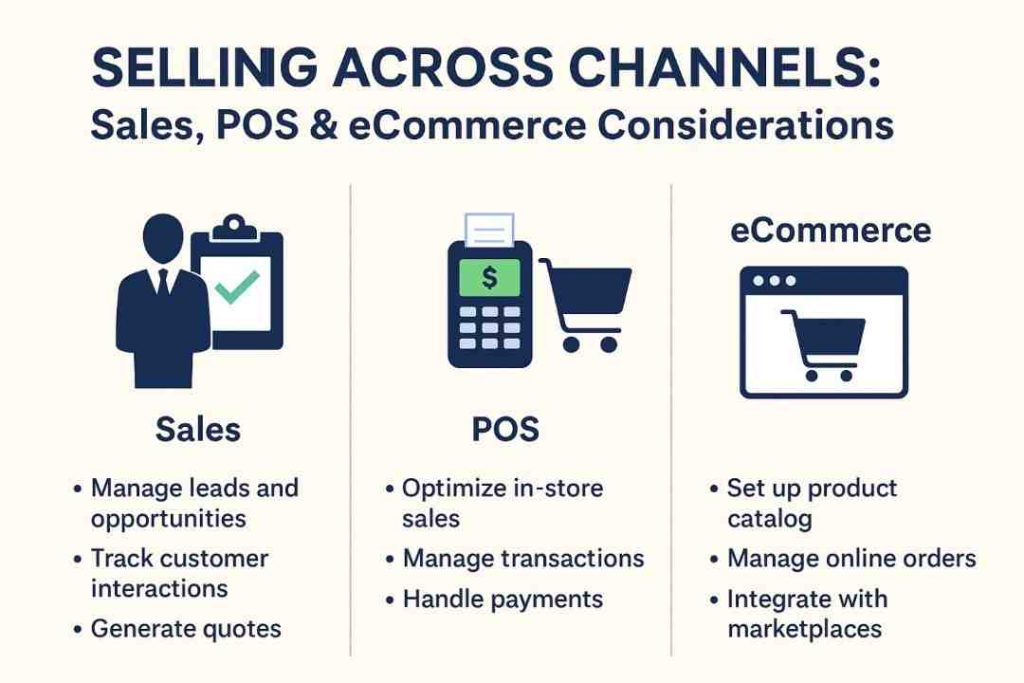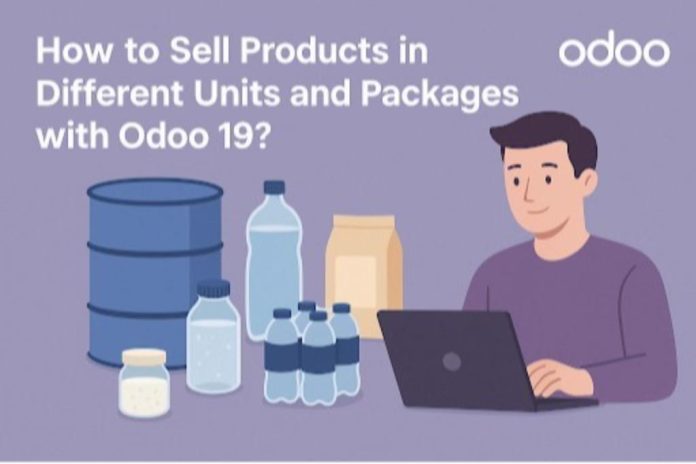Consider a business that purchases chemicals in drums, stores them in liters, and sells them in small bottles or packs. Without proper systems in place, this creates massive confusion, inventory mismatches, incorrect valuation, and inconsistent customer experience.
This challenge isn’t limited to chemical suppliers. A fabric wholesaler may buy in bolts but sell by the meter. A snack manufacturer may purchase raw materials in bulk, store them by weight, and sell them in individual pouches or six-packs. When multiple units of measure aren’t tracked accurately across the procurement-to-sale cycle, businesses lose money, miscalculate stock, and fail to maintain pricing consistency.
With an innovative ERP implementation, businesses can map every unit conversion, whether it’s drums to liters or bolts to meters, ensuring accurate stock valuation, automated conversions, transparent pricing, and greater customer trust.
With Odoo 19, businesses can easily handle this complexity for the first time. The new release provides a single UoM and Product Packaging solution that makes it easier for you to buy, store, and sell across all channels. Let’s explore how.
Table of contents
How Odoo Models Units of Measure (UoM) & Packaging in v19
Odoo’s Units of Measure (UoM) define how products are counted or measured in transactions. Whether a product is sold by unit, dozen, liter, or kilogram, Odoo automatically handles the conversion between these units to maintain accuracy across sales, purchases, and inventory. For businesses with more complex measurement rules or industry-specific workflows, Odoo customization services can further enhance and tailor UoM handling to fit unique operational needs.
Packaging, on the other hand, refers to the physical grouping of products – such as in boxes, crates, or pallets. Packaging not only manages logistics but also supports pricing, labeling, and stock traceability.
Odoo 19 is an improvement over the previous version; it provides a simplified, unified structure in which UoM and packaging data are treated consistently across modules.
What Are Units of Measure (UoM)?
A Unit of Measure describes the way products are counted or measured in Odoo. You might sell by unit, dozen, liter or kilogram and Odoo automatically converts from one to another.
For example, 1 Box = 12 Units or 1 Roll = 25 Meters. This guarantees proper stock updates as well as correct billing.
Understanding Product Packaging
Packaging is defined as the physical grouping of goods – boxes, crates, pallets. Each package has a fixed quantity and UoM. Packaging doesn’t change stock levels by itself, but determines how goods are sold, shipped, and displayed on websites or invoices.
Unified UoM & Packaging in Odoo 19
Odoo 19 introduces a streamlined structure that handles both UoM and packaging more consistently than earlier versions. Sellers now get:
- Inventory UoM for internal tracking
- Purchase UoM for supplier dealings
- Sales UoM for customer-facing operations
It even supports multi-level packaging (e.g., pack-in-pack hierarchies), making product handling more intuitive and reliable for modern businesses.
Selling Across Channels: Sales, POS & eCommerce Considerations

Odoo 19 ensures consistency across all sales channels with the best Odoo integration.
Sales Orders
Customers can give a particular UoM or packaging on a Sales Order line. Odoo auto-converts values for inventory and accounting purposes. The invoices and delivery orders are perfectly aligned for both customers and teams.
Point of Sale (POS)
In POS, you can sell either by the unit or as a package. To avoid confusion:
- Use descriptive product names (e.g., “Soda – Single Bottle” vs. “Soda – 6-Pack”).
- Give each packaging type a unique bar code.
This helps cashiers scan faster and reduces checkout errors.
eCommerce
Odoo 19 now lets you select multiple UoMs and packaging options directly on the website. Customers may select from sizes/packs directly from the product page.
Example:
“Single Bottle ₹50 (₹100/L)”
“6-Pack ₹270 (₹90/L, save 10%)”
Display both per-unit and per-pack prices to increase transparency and sales.
Behind the scenes, Odoo automatically converts sales quantity back into the inventory UoMs to keep your stock in all your warehouses accurate.
Advanced Scenarios & Best Practices
Kits / Bundles / Combos
When it comes to fixed combinations (i.e., Gift Combo: Shampoo + Conditioner), Kit or Bundle products are to be used. BOM (Bill of Materials) logic at Odoo enables easy configuration of POS/eCommerce combos.
Barcodes & Scanning
Assign different packaging types to distinct barcodes to accelerate warehouse operations.
Naming & Ratios
Name UoM names should be kept concise (e.g., Box (12 Units)) and must be made out of whole numbers. This avoids the fractional counts of stock.
Stock Valuation
Whenever you perform an automated valuation, make sure your cost calculations are appropriate for converting UoMs to the correct form.
Warehouse tip: Label shelves with packaging types and ensure incoming shipments match the PO UoMs.
Troubleshooting & Common Pitfalls
Here are a few issues users often face:
- Mismatched UoM Categories: Conversions only work within the same category (e.g., Weight vs Length).
- Missing Purchase UoM: Leads to wrong receipt quantities.
- Rounding Errors: Check decimal precision in UoM configuration.
- Multi-Company Visibility: Packaging records can be company-specific, verify the “Company” field.
If issues occur, review logs under Settings → Technical → Logs or test on a staging database before applying to production.
Proper configuration, testing, and expert assistance from an experienced Odoo development company can help you avoid most pitfalls.
How to Pick the Best Odoo Development Company for Integration + Migration
You must have a good partner to be successful. These are some of the things to consider when vetting an Odoo development company:
- Proven track record in Odoo ERP Migration and Data Migration
Request case studies from customers who have migrated from older ERPs or Odoo versions; inquire about the number of modules/integrations they have implemented. - Expertise in custom modules and integrations
They need developers who are conversant with the Odoo API, webhooks, custom modules, and integration patterns. - Strong planning and project management skills
Good companies will provide a migration plan, a risk analysis, schedules, and milestones. - Testing & QA capabilities
Check that they provide sandbox testing, user acceptance testing, and rollback plans. - Support & post-migration service
Once it goes live, it will never be free of tweaks, bug fixes, and user support. You want someone who will not fade away when the launch takes place. - Security, data privacy, and compliance
Make sure the company is practicing security best practices, encrypting data transfers, complying with applicable regulations (GDPR, etc.), and is well-supported.
Conclusion
There is no longer a need to make product sales across various units and packages complex. The flexible UoM and packaging system in Odoo 19 allows managing various sales procedures, accurately converting inventory, and integrating data channels.
To maximize these features, it is crucial to select the most appropriate and reliable Odoo integration partner. Odoo can also be configured, customized, and extended with the assistance of a professional Odoo development firm, such as BiztechCS. BiztechCS ensures seamless Odoo ERP and data migrations and smooth system integrations, so every part of your solution works flawlessly, making your business smarter, faster, and error-free.
Suppose you want your business to become more successful, with scalable automation and unshakeable accuracy. In that case, the Odoo professionals at BiztechCS can help you achieve success end-to-end.











